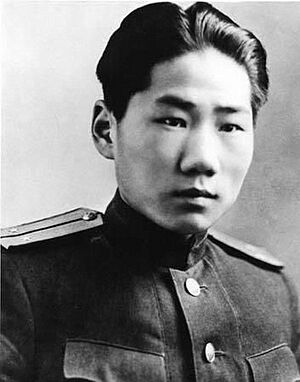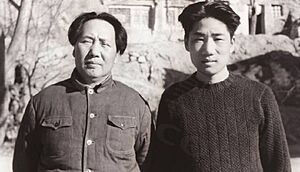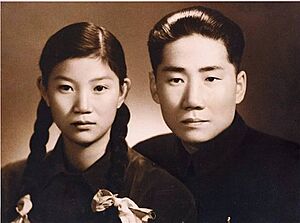Mao Anying facts for kids
Quick facts for kids
Mao Anying
|
|
|---|---|

Mao Anying in a Soviet officer's uniform
|
|
| Native name |
毛岸英
|
| Born | 24 October 1922 Xiangya Hospital, Changsha, Hunan, Republic of China |
| Died | 25 November 1950 (aged 28) Tongchang, North Pyongan, North Korea |
| Allegiance | |
| Rank | |
| Battles/wars | World War II Chinese Civil War Korean War † |
| Spouse(s) |
Liu Songlin
(m. 1949) |
| Relations | Mao Zedong (father) Yang Kaihui (mother) |
Mao Anying (Chinese: 毛岸英; pinyin: Máo Ànyīng; born October 24, 1922 – died November 25, 1950) was a Chinese military officer. He was the oldest son of Mao Zedong, who later became the leader of China. His mother was Yang Kaihui. Mao Anying studied in Moscow, Russia, and fought in several wars. He was killed during the Korean War by an air strike.
Contents
Growing Up

Mao Anying was born in Changsha, Hunan Province, China. His mother, Yang Kaihui, was the second wife of Mao Zedong. She was executed in 1930 by the Kuomintang, which was a political party that opposed the Communists.
After his mother's death, Mao Anying and his younger brother, Mao Anqing, went to Shanghai. Their father, Mao Zedong, was in another part of China at the time. The brothers attended a secret kindergarten run by the Chinese Communist Party.
In 1933, the Communist Party faced difficulties, and the kindergarten lost its support. Mao Anying and his brother ended up living on the streets for a while.
Fighting in World War II
In 1936, Mao Anying and his brother were found and taken to Moscow, in the Soviet Union. They lived there and attended a special school called Interdom. His stepmother, He Zizhen, also joined them later.
During World War II, Mao Anying asked Joseph Stalin, the leader of the Soviet Union, if he and his brother could join the Soviet Red Army. They were allowed to join. Mao Anying graduated from two military academies in 1943. He then served as a deputy commander of a tank platoon. He fought against Nazi Germany in Poland, Czechoslovakia, and during the final Battle of Berlin.
After the war in Europe ended, Mao Anying was sent to the Soviet Far East. He took part in the Soviet-Japanese War. He was recognized for his actions in military operations and received two Soviet military awards.
In 1946, Mao Anying returned to China. He fought in the Chinese Civil War against the Kuomintang. He reached the rank of Major General in the Peoples Liberation Army. Later, he worked as a secretary and translator in Beijing.
Korean War and His Death
In June 1950, Mao Anying wanted to join the Chinese People's Volunteer Army (PVA) as an officer in the Korean War. The PVA commander, Peng Dehuai, and other high-ranking officers were worried. They feared what Mao Zedong would say if his son was killed. They tried to stop him from joining.
However, Mao Zedong insisted that his son be allowed to go. Peng Dehuai then assigned Mao Anying to be his personal secretary and Russian translator. Mao Anying used the fake name "Secretary Liu." They worked at the PVA headquarters, which was hidden in caves. These caves were thought to be safe from air attacks by the United Nations (UN) forces.
On November 24, 1950, two UN aircraft were seen flying overhead. The next day, November 25, four American B-26 planes dropped napalm bombs. One of the bombs hit a building near the caves. Mao Anying and another officer, Gao Ruixin, were killed.
There are different stories about why Mao Anying was in the building. Some say he was cooking food during daylight hours, which was against army rules. Others say he was getting documents or sleeping late. Another idea is that the Americans found the headquarters by listening to radio messages and using air reconnaissance.
Peng Dehuai saw the explosion and tried to reach Mao Anying. His guards had to hold him back to keep him safe. Mao Anying's body was badly burned. It was identified only by a Soviet watch that Joseph Stalin had given him.
Peng Dehuai immediately reported Mao Anying's death. However, other leaders decided not to tell Mao Zedong right away. He only learned the news in January 1951. Mao Anying was buried in Pyongyang, North Korea, in a cemetery for Chinese heroes.
Debates About His Death
Some people have debated the exact details of Mao Anying's death. The planes that dropped the bombs were American B-26s. Some stories incorrectly claimed that a South African pilot was responsible. However, South African pilots in Korea flew different types of planes.
There is a story, mostly spread online, that Mao Anying died because he was cooking egg fried rice for breakfast. This was supposedly done during the day, which was against orders because it could attract enemy planes. This story suggests that the smell or smoke from cooking drew the attention of American bombers.
The "egg fried rice" story has never been officially confirmed. The Chinese Academy of History, a government research group, has said it is a rumor. They state that Mao Anying's location was found because the camp's radio signals were being intercepted by the enemy.
"Egg fried rice protests" are a form of internet protest in China. Around Mao Anying's birthday (October 24) or the date of his death (November 25), some Chinese internet users post recipes for egg fried rice. This is meant to mock his death. Chinese officials usually block or remove these posts and may punish those who share them.
See also
 In Spanish: Mao Anying para niños
In Spanish: Mao Anying para niños
- Yakov Dzhugashvili
- Chiang Wei-kuo
- Quentin Roosevelt
- Louis-Napoléon, Prince Imperial
 | Mary Eliza Mahoney |
 | Susie King Taylor |
 | Ida Gray |
 | Eliza Ann Grier |


